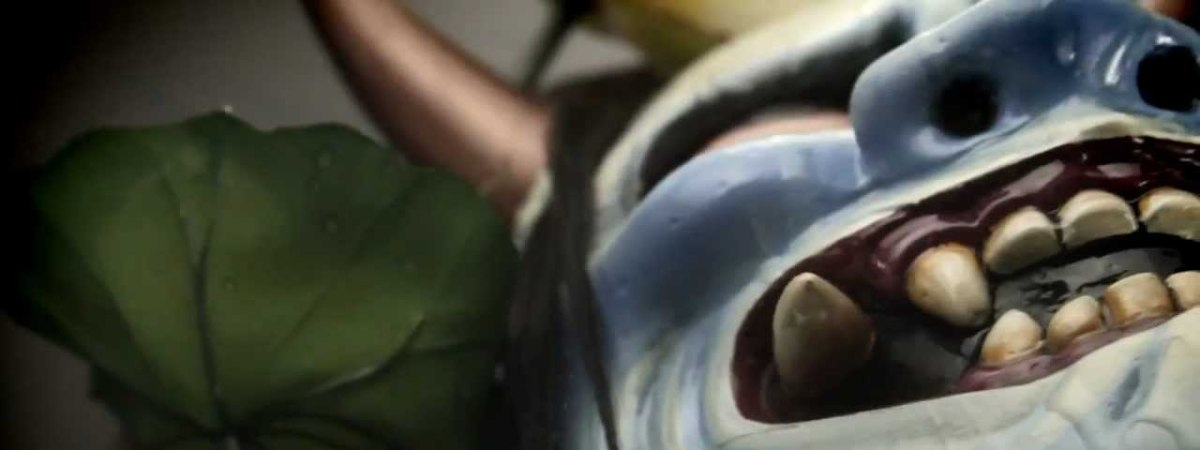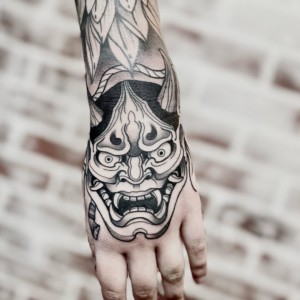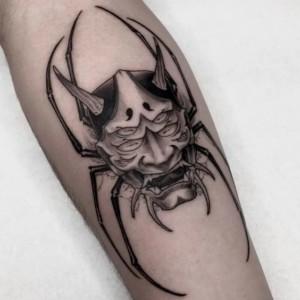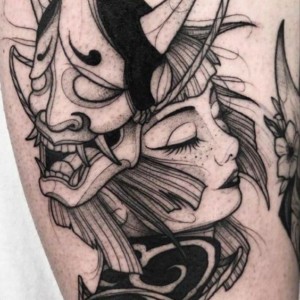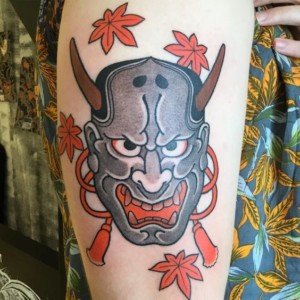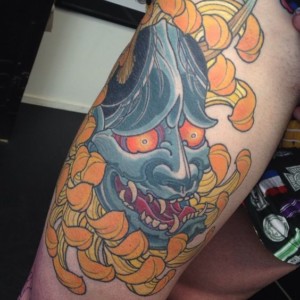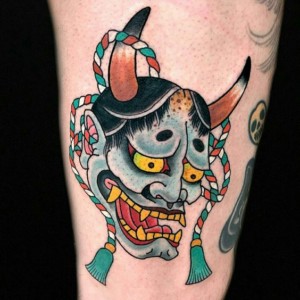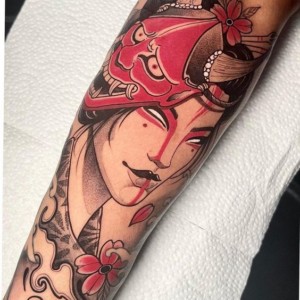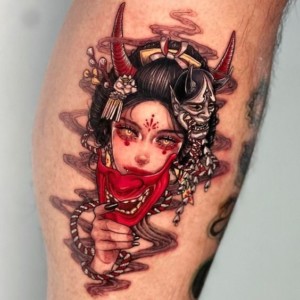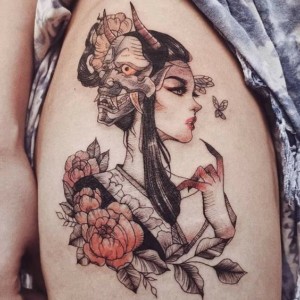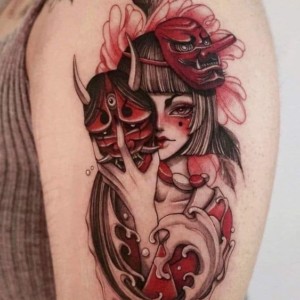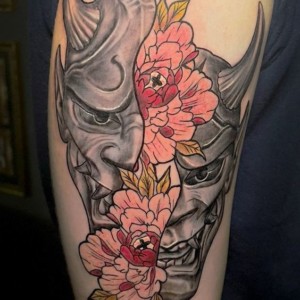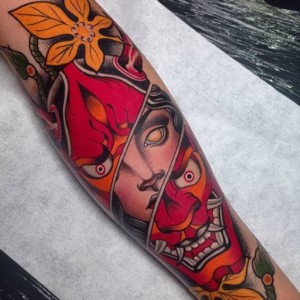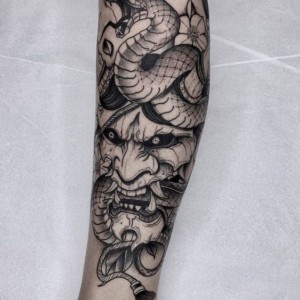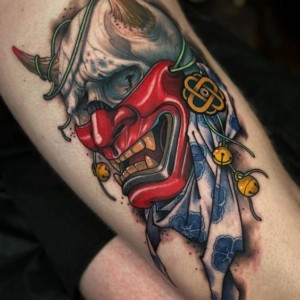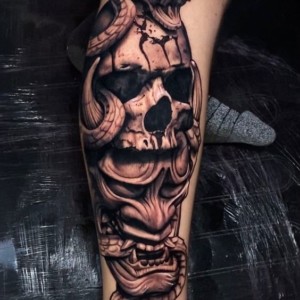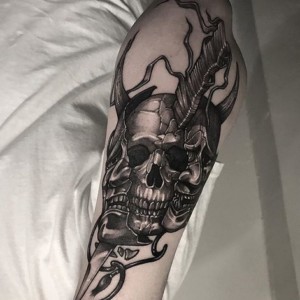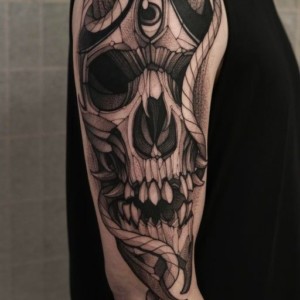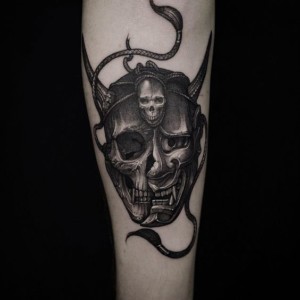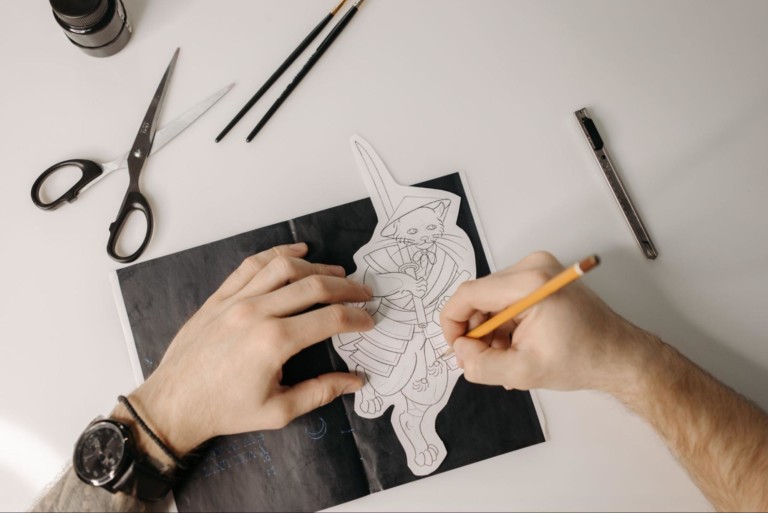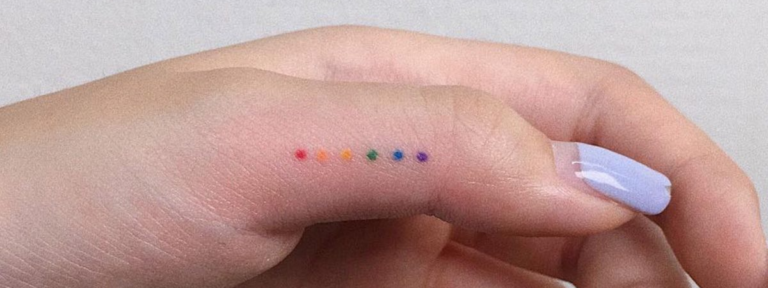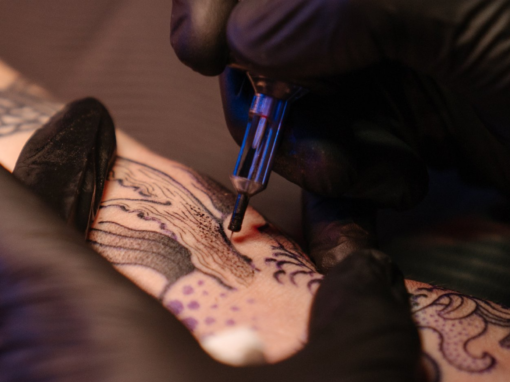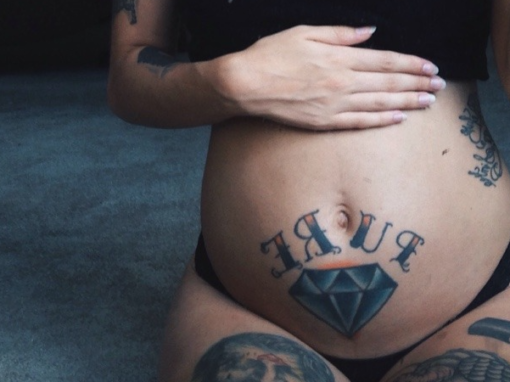Tattoos with a Japanese theme have become very popular worldwide. Most likely, you have seen mask tattoos with sharp fangs and evil but sad eyes. Of course, it’s a hannya mask tattoo. But do you know what it signifies and how it was created? The hannya mask is an ancient symbol. It represents a woman consumed by jealousy, but its meaning goes much deeper. In the world of tattoos, it serves as a canvas for a variety of emotions and stories.
If you’re looking for an idea for a new Japanese-themed tattoo, you’ve found the right article. We have collected more than 60 unique Japanese mask tattoo designs for you. In addition, you will learn about its origin and secret meanings. In our article, let’s delve into ancient Japanese culture to learn everything you need to create a unique design.
History Behind the Hannya Mask Tattoo
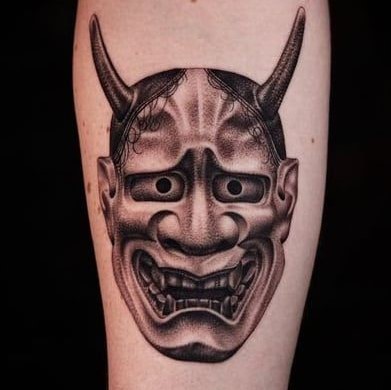
Tattoo artists appreciate hannya masks for their artistic beauty, but that’s far from the only reason for their popularity. The first of these masks was made back in medieval times and was used in the theater. Even now, the hannya mask continues to shine on the Japanese stage. But it’s a globally recognizable image that you’ve likely seen, as it’s often used in anime and movies about ancient Japanese culture.
Let’s start with what the hannya mask is. It represents a woman overwhelmed with jealousy to the point of turning into a demon. The first to use the hannya mask in their tattoos were Japanese criminal gangs, better known as the Yakuza. Yakuza tattoos played an important role in their life and hierarchy. They have given this mask additional symbolism but did not forget about its original meaning. Although the yakuza played a significant role in popularizing the hannya mask outside of Japan, it is important to remember that it existed long before its image was used by the yakuza.
Hannya Mask in Traditional Theater
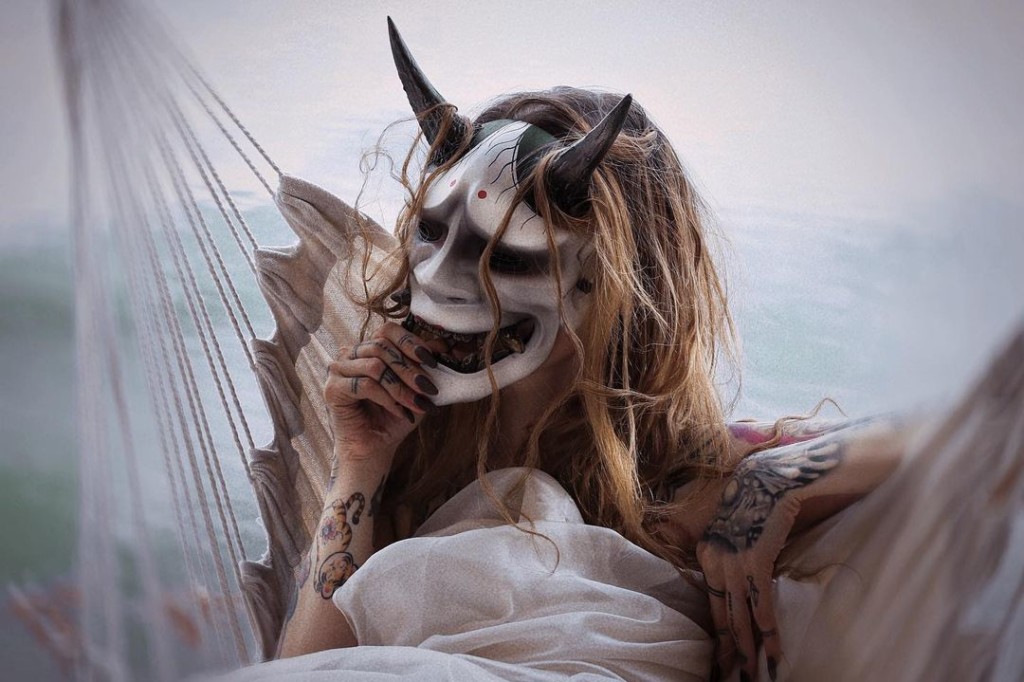
We don’t know exactly when the hannya mask was created, but the oldest one we found dates back to the 16th century. Actors in traditional Japanese Noh theater wore it during performances. In this theater, each type of character was presented with a unique mask. The hannya mask was given the tragic role of a betrayed woman. The common myth of transformation into a demonic creature was very popular in Japan. With the help of the mask, the actors conveyed the transformation of a beautiful woman into a mad spirit obsessed with revenge and jealousy.
The hannya mask is such a deep symbol that even its name has meaning. It can be translated as wisdom. But where could the mask of a jealous demon get such a name? There are 2 main versions. According to the first, it was named after its creator, the Japanese monk Hannya-bō. According to the second, to create such a complex mask, the master had to have skill and wisdom.
Sometimes the hannya mask can be difficult to distinguish from other Japanese masks, as it has several variations. They differ in skin color and strength of demonic features and are usually divided into three types: white, pale red, and deep red. The first shows a woman who is overtaken by negative emotions, while the third depicts a demon with nothing left of a human being in it.
Oni Mask vs. Hannya Mask
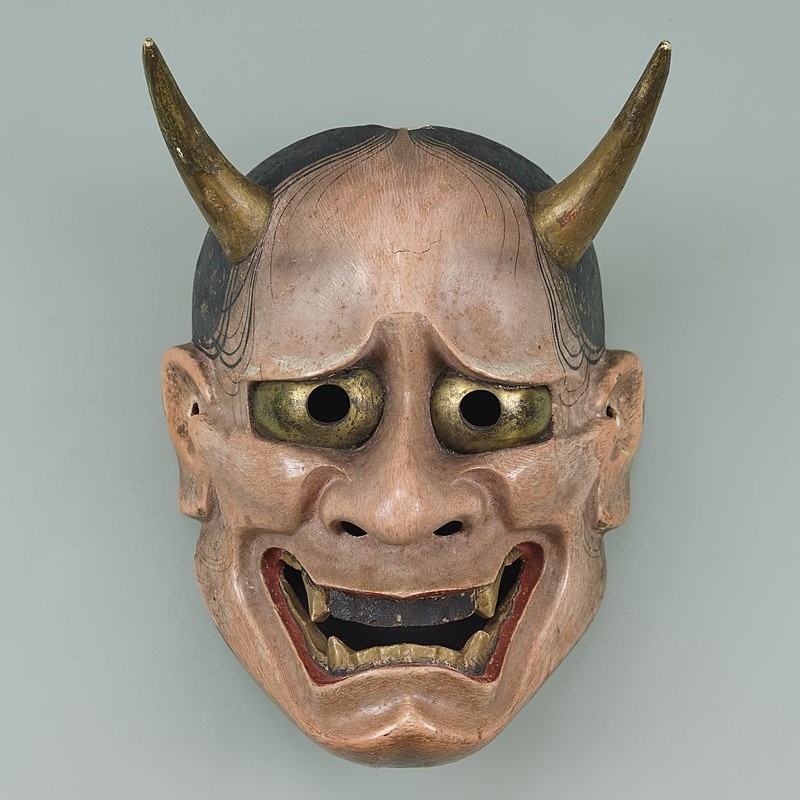
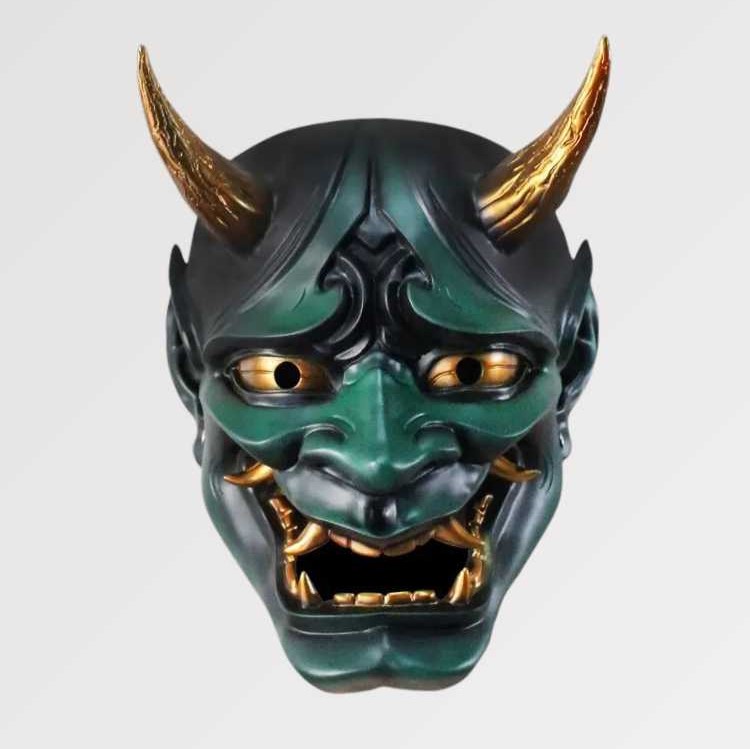
Here you can see the hannya mask in the left picture and the oni mask in the right picture.
Tattoos in the form of Japanese masks are very popular, but not many know that they often depict two different masks. Although the images clearly show the difference between oni and hannya masks, it is not always that obvious, and many people confuse them. Hannya and oni mask tattoos both depict demonic beings and in Japanese mythology, they are recognized by the emotions they represent, but the main difference between them is their gender.
The oni mask symbolizes an aggressive male demon. It is often depicted with long fangs and red skin, although blue is also common. Its image is characterized by sharp, fierce features. The hannya mask is often depicted with white or red skin and has a more melancholic undertone.
In modern art, each tattoo artist brings their vision to the image of each mask. Because of this, it is sometimes impossible to distinguish one mask from the other. But in most cases, if you see a samurai tattoo in a horned mask, it is likely the oni mask, while geishas are more often depicted with the hannya mask.
Hannya Mask Tattoo Meaning: Duality of the Symbol
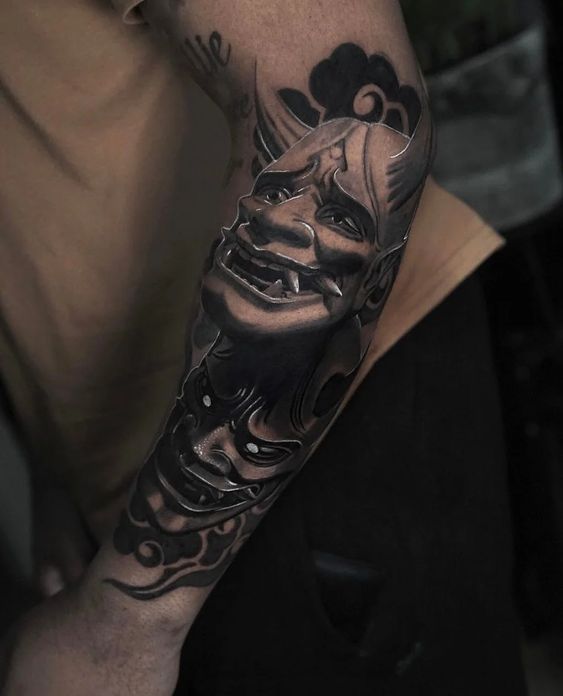
The meaning of the hannya mask is a mix of positive and negative aspects. It may be confusing to some, but we have done a detailed analysis and highlighted 8 main meanings of the Japanese mask. But if you want to skip that part, you can jump straight to the part of our article where we’ve collected the most popular hannya mask tattoo designs.
Because of the complex and dual meaning of the hannya mask, these tattoos are sometimes called two-faced tattoos, the meaning of which is fully expressed in the contrast of the human face and the demonic mask. Hannya mask tattoos reflect the deep duality of the human experience with dark and light aspects, making them an interesting and meaningful choice for those seeking to express the complexity of life through ink.
We’ve gathered the top Japanese mask tattoo meanings, splitting them into positive and negative aspects. Among tattoo fans, there is a belief that such a tattoo can attract negative events, or that only a woman can get it. This, of course, is not true. These tattoos are open to both women and men, and they can symbolize a variety of emotions without causing harm.
Negative Side
The hannya mask symbolizes a woman overwhelmed with jealousy. This image can be intimidating and bring back negative memories. Despite this, people with a difficult fate often get ink with this meaning, as a way to come to terms with the past or the negative aspects of their emotions. Let’s look at the negative aspects of this Japanese mask.
- Anger and jealousy
There are strong negative emotions in all of us that we used to hide. But sometimes they come out and make us look like a hannya mask. This mask depicts a woman overwhelmed with jealousy, anger, and hurt, so much so that she becomes a demon. It symbolizes moments when we’ve been consumed by strong emotions that can cloud our judgment and lead to negative actions. It is a very strong symbol that can reflect the darker sides of your feelings.
This section is featured by our tattoo artist Matt Monroe.
- Demonic evil
The hannya mask embodies the essence of a demonic and vengeful spirit. It is the embodiment of the darkest aspects of human nature, reminding us that we are all capable of evil in certain situations. It serves as a warning symbol, urging us to be mindful of our actions and their consequences.
- Ghosts of the past
These tattoos can also be seen as a visual representation of the ghosts of our past. They signify haunting memories and experiences that continue to haunt our present and influence our choices. The hannya mask is a powerful way to acknowledge and come to terms with these ghosts.
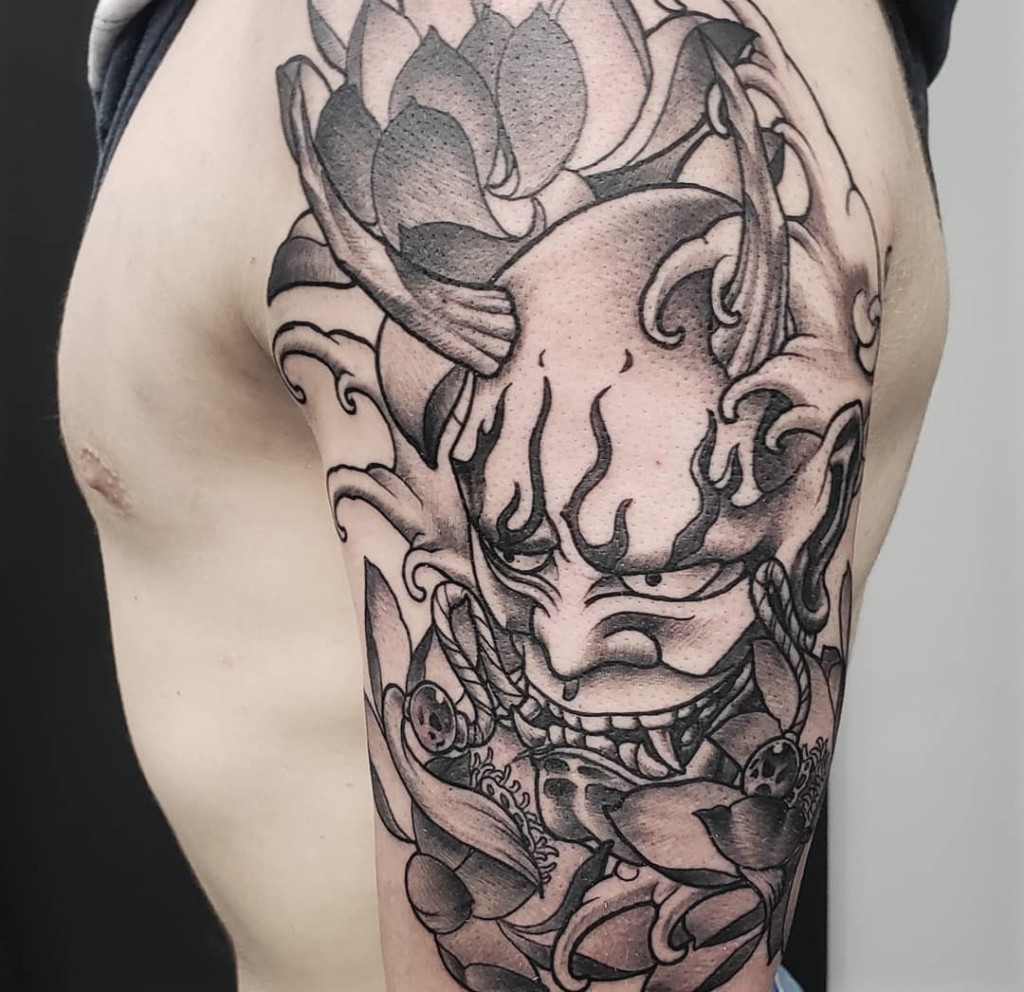
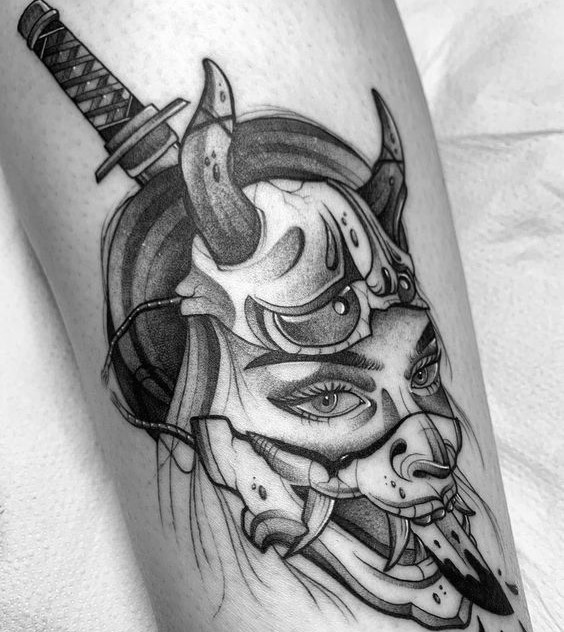
This section is featured by our artist Matt Folse.
- Tormented female spirit
We are usually driven to strong negative emotions by inner pain. While this symbolism might lead some to think that the hannya mask is a woman’s tattoo, it’s important to clarify that it’s not limited by gender. Many men also choose Japanese mask tattoos as a reflection of inner feelings. It is a symbol of the emotional turmoil and inner struggles that many face in their lives.
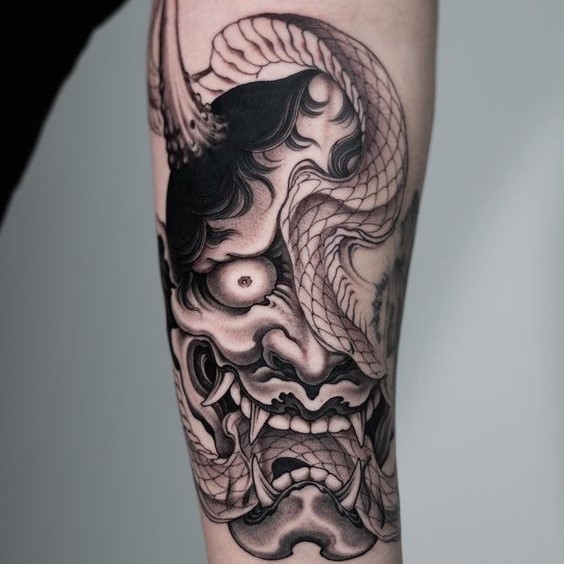
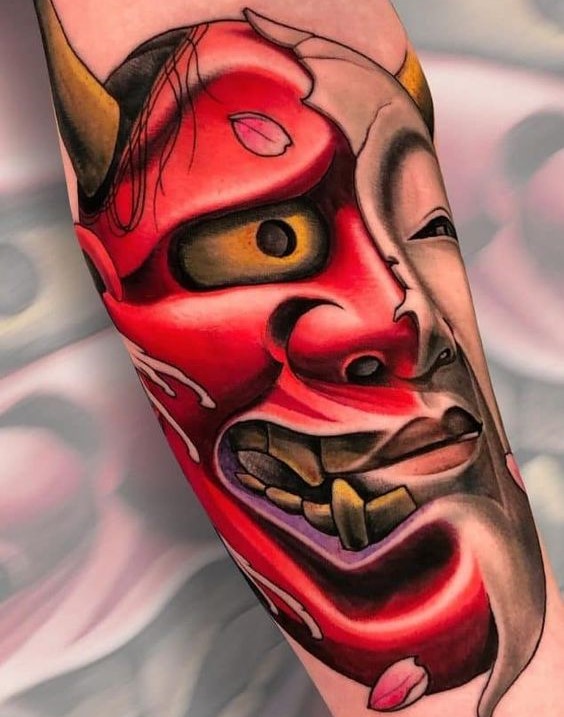
Positive Side
After so many negative meanings, you may have a dark impression of the hannya mask. But like many symbols of Japanese culture, this mask has another side filled with positive aspects. This tattoo has a unique duality that goes beyond just darkness. So while it may carry heavy symbolism, we invite you to explore the positive aspects of the hannya mask tattoo.
- Good luck
In all ancient cultures, people believed that to ward off dangerous spirits, you had to look like them. The tradition of dressing up in scary Halloween costumes came to us from this belief. The Japanese also believe that the scary look of a hannya mask keeps away evil spirits that bring bad luck.
This section is featured by our tattoo artists Dave Regan and Matt Monroe.
- Wisdom
Although it may seem strange to us, in traditional culture this mask is associated with a deep understanding of the inner self. The explanation can be found in oriental philosophy, only a person living in harmony with himself can rise above negative emotions.
This section is featured by tattoo artists Sierra Colt and Matt Monroe.
- Lessons of the past
For those who choose to associate their hannya mask tattoo with hurtful events in the past, it doesn’t always have a negative meaning. It encourages us to reflect on our experiences and use them as guides to make better choices in the future. A person with this tattoo wants to become better every day and does not judge others for past mistakes.
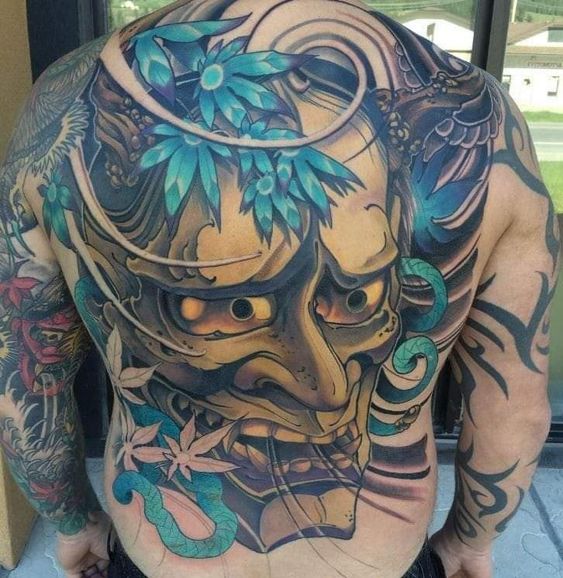
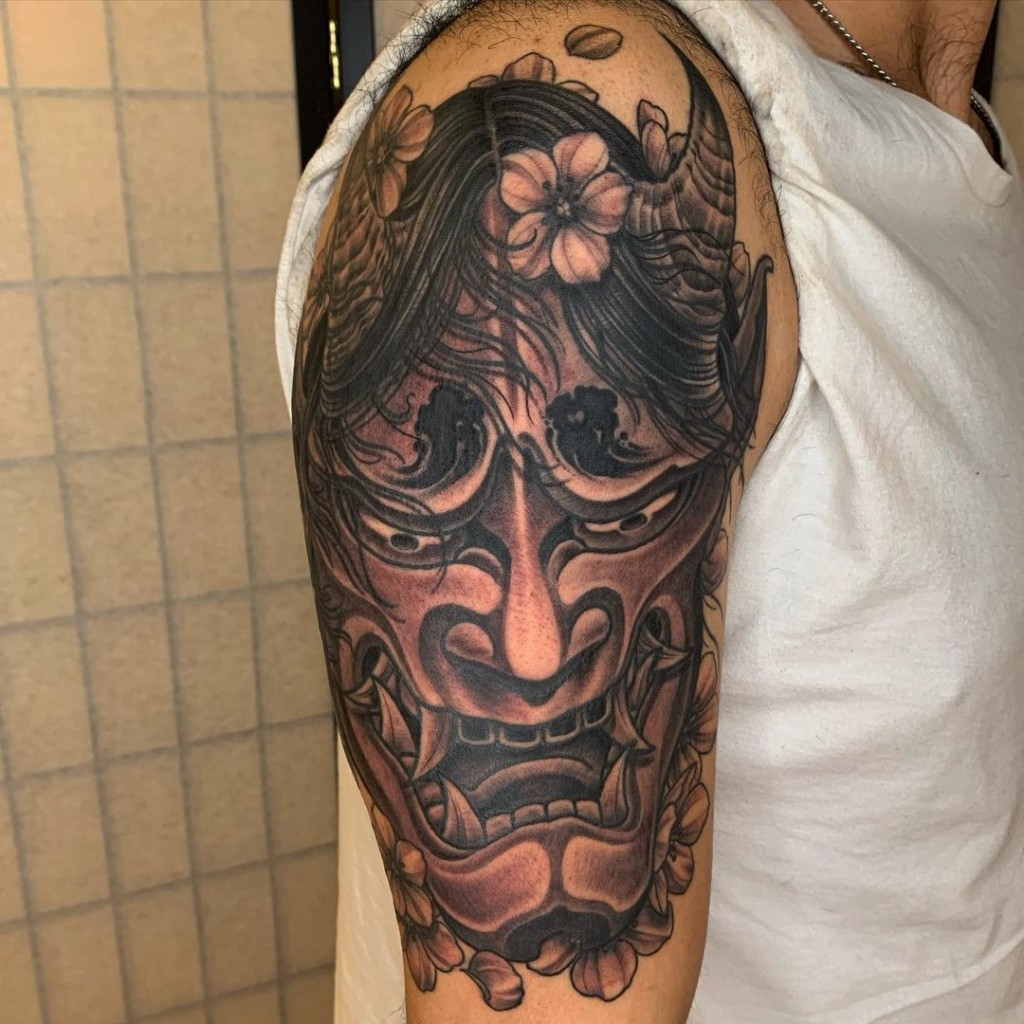
- Passion and love
The hatred that a hannya mask tattoo reflects always grows where once was a great love. It recognizes the intensity of our feelings and their potential to lead to both happy moments and the pain of betrayal. This hannya mask tattoo meaning can remind you about the importance of expressing your emotions and enjoying joyful moments with your loved ones.
Popular Designs for Hannya Mask Tattoo
It may surprise you, but the hannya mask tattoo became popular not so long ago. Nevertheless, we have collected a lot of stunning designs for you. Among them, you are sure to find one that suits your tastes and style. Let’s take a look at five of the most popular ideas with unique examples.
Traditional Japanese Style
The classic version of the hannya mask tattoo design is the traditional Japanese style, known for its rich symbolism. Intricate details, vibrant colors, and strong expressions embody the duality of emotions and the cultural heritage of Japan. You probably won’t be surprised to learn that this design came to us from the Yakuza. However, you can do this ink without fear if you like it.
Geisha Wearing a Hannya Mask
These beautiful tattoos depict a geisha hiding her face behind a hannya mask. Geisha were highly respected women in Japan, they were invited to tea ceremonies to entertain men with conversation, music, and dancing. Geisha trained for many years to control their emotions flawlessly. A tattoo of a geisha with a horrible mask creates a striking contrast that appeals to many tattoo lovers. It is a symbol of the complexities hidden beneath a seemingly calm face.
Tattoo of a Broken Hannya Mask
Like a whole mask, a broken one also has a dual meaning. In its positive interpretation, a tattoo of a broken hannya mask symbolizes transformation and freedom from negative emotions. It is a symbol of personal growth and overcoming the demons of the past. In the negative meaning, it is associated with bad luck and loss of control over emotions. It is you and your experiences that finally determine what meaning your tattoo will carry.
Hannya Mask Tattoo With a Snake
Adding a snake to a hannya mask tattoo will give it a new meaning. The snake represents danger and deception, emphasizing the idea that emotions can sometimes lead us down treacherous paths. Such tattoos were popular among the yakuza, for whom the snake symbolized immortality. When combined with a hannya mask, such ink could speak of the vengeful nature of its owner.
Hannya Mask Tattoo With a Skull
Combining a hannya mask with a skull creates a striking and somewhat sinister design. It symbolizes the fusion of death and the chaos of human emotions. The skull means mortality and the transience of life, while the meaning of the hannya mask represents strong emotions and transformation. This design encourages reflection on the impermanence of life and the constant struggle for balance in the chaos of human emotions.
Summary
Hannya mask tattoos can carry deep meanings, both positive and negative. They reflect the duality hidden within each of us. Such a tattoo can become a unique reflection of your character and past. To help you find inspiration, we’ve explored over 50 stunning designs in various styles. Additionally, we’ve learned about the origin of the hannya mask and how it differs from another popular mask, the oni mask, and delved into the profound meanings of the hannya mask.
We hope that the image of this Japanese mask will bring you luck and help you find balance in the chaos of life.
FAQ
🤔 What Does the Hannya Mask Tattoo Mean?
The hannya mask tattoo symbolizes a complex duality of emotions. On the one hand, it represents anger, jealousy, and emotional pain. It can also signify malevolent or vengeful aspects of human nature. On the other hand, it symbolizes wisdom, good luck, and the potential to learn from life’s challenges. In essence, it captures the profound emotional and moral complexity within all of us.
🧔 Can Men Get a Hannya Mask Tattoo?
Yes, both men and women can get hannya mask tattoos. These tattoos are not limited by gender, and they are popular among people of all genders who appreciate their symbolism and artistic appeal.
🔎 Is a Hannya Mask Tattoo Good or Bad?
A hannya mask tattoo is neither inherently good nor bad; its meaning depends on the individual and the context. It can symbolize both negative emotions, such as anger and jealousy, and positive qualities, such as wisdom and luck. You can learn more about the meaning of the hannya mask tattoo in our article.
🗾 Is a Hannya Mask Tattoo a Cultural Appropriation?
A hannya mask tattoo is not cultural appropriation if it is approached with respect and an understanding of its cultural significance. It’s important to approach cultural symbols with sensitivity and awareness to avoid cultural appropriation.
👹 What Is the Difference Between an Oni Mask Tattoo and a Hannya Mask Tattoo?
Hannya and oni mask tattoos are rooted in Japanese culture and theater but represent different themes. Oni masks represent demons in Japanese folklore and are often associated with aggression, while the hannya masks represent the jealous and vengeful female demon. Although both masks have a frightening appearance, they carry different meanings in the art of tattooing.
